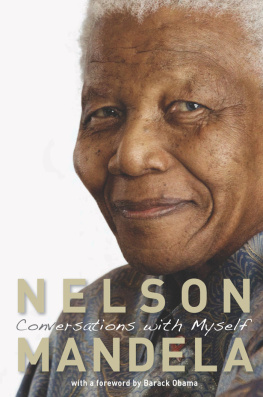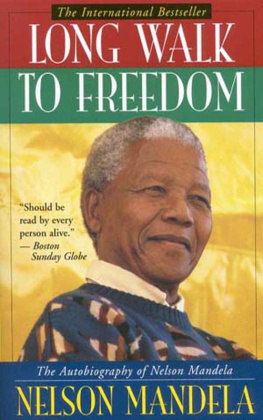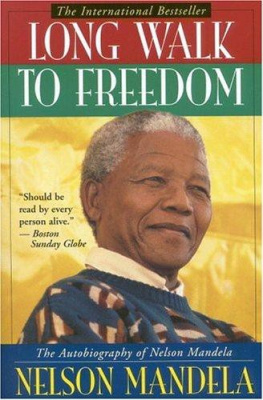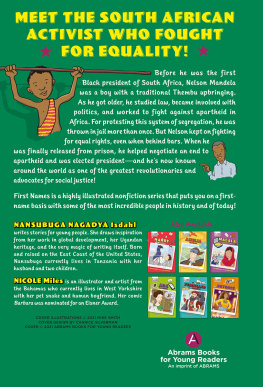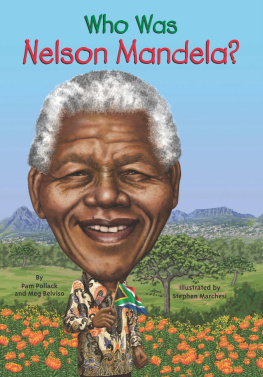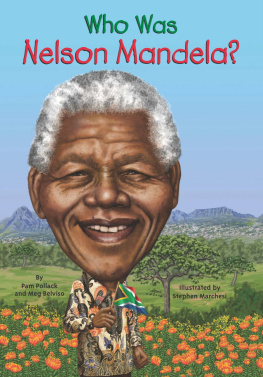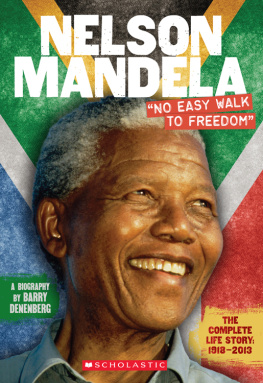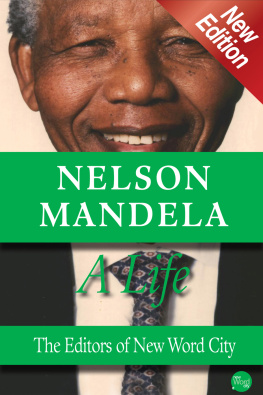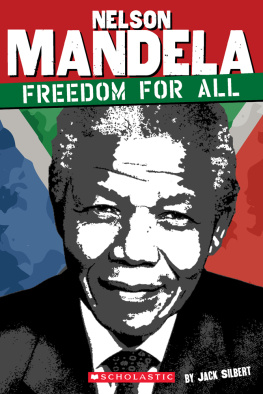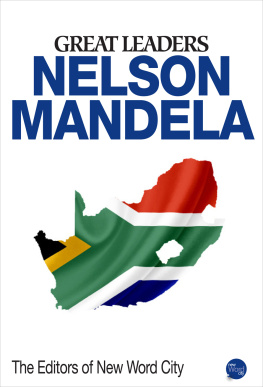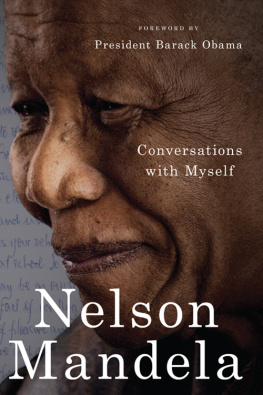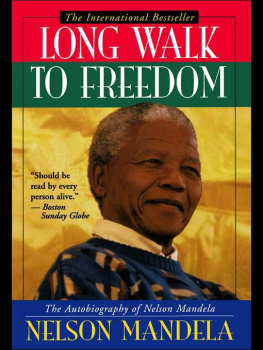Mandela - Conversations with Myself
Here you can read online Mandela - Conversations with Myself full text of the book (entire story) in english for free. Download pdf and epub, get meaning, cover and reviews about this ebook. publisher: Pan Macmillan Australia, genre: Politics. Description of the work, (preface) as well as reviews are available. Best literature library LitArk.com created for fans of good reading and offers a wide selection of genres:
Romance novel
Science fiction
Adventure
Detective
Science
History
Home and family
Prose
Art
Politics
Computer
Non-fiction
Religion
Business
Children
Humor
Choose a favorite category and find really read worthwhile books. Enjoy immersion in the world of imagination, feel the emotions of the characters or learn something new for yourself, make an fascinating discovery.
Conversations with Myself: summary, description and annotation
We offer to read an annotation, description, summary or preface (depends on what the author of the book "Conversations with Myself" wrote himself). If you haven't found the necessary information about the book — write in the comments, we will try to find it.
Mandela: author's other books
Who wrote Conversations with Myself? Find out the surname, the name of the author of the book and a list of all author's works by series.
Conversations with Myself — read online for free the complete book (whole text) full work
Below is the text of the book, divided by pages. System saving the place of the last page read, allows you to conveniently read the book "Conversations with Myself" online for free, without having to search again every time where you left off. Put a bookmark, and you can go to the page where you finished reading at any time.
Font size:
Interval:
Bookmark:
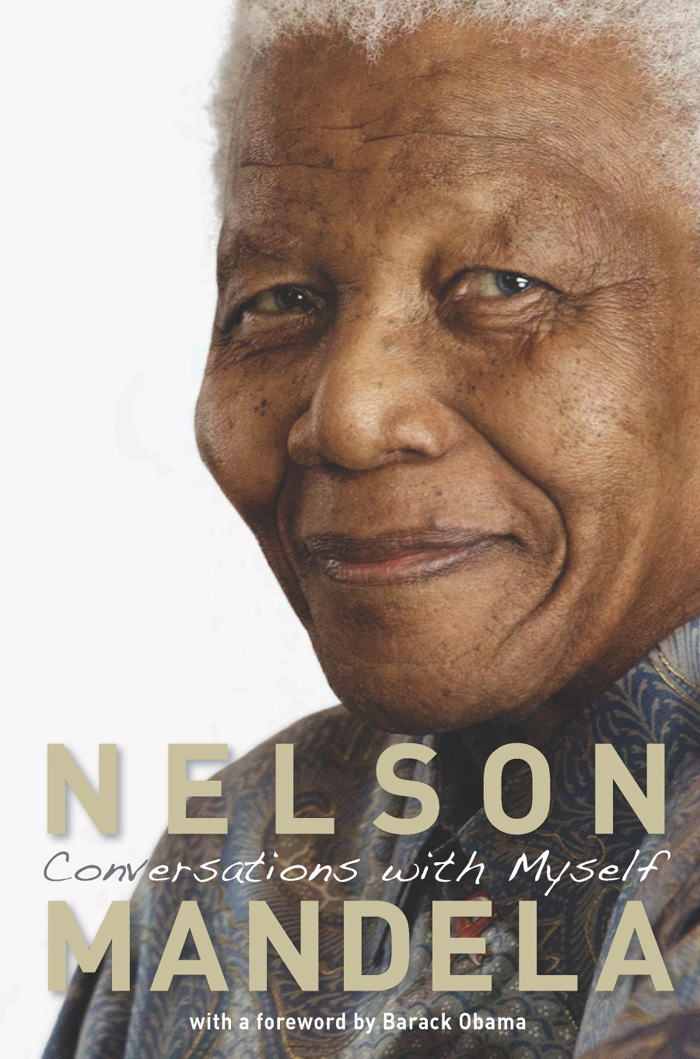
Conversations with Myself
NELSON
MANDELA

First published 2010 by Macmillan
an imprint of Pan Macmillan, a division of Macmillan Publishers Limited
Pan Macmillan, 20 New Wharf Road, London N1 9RR
Basingstoke and Oxford
This Macmillan edition published in 2010 by Pan Macmillan Australia Pty Limited
1 Market Street, Sydney
Text copyright 2010 by Nelson R. Mandela
and The Nelson Mandela Foundation
Foreword copyright 2010 Barack Obama
Concept and design copyright 2010 by PQ Blackwell Limited
Book design: Cameron Gibb
The moral right of the author has been asserted.
Owing to limitations of space, all acknowledgments for permission to reprint previously
published and unpublished material can be found on page 444.
The right of Nelson R. Mandela and The Nelson Mandela Foundation to be identified as the
author of this work has been assserted in accordance with the Copyright, Designs and
Patents Act 1988.
All rights reserved. No part of this publication may be reproduced, stored in or introduced into a retrieval system, or transmitted, in any form, or by any means (electronic, mechanical, photocopying, recording or otherwise) by any person or entity (including Google, Amazon or similar organisation) without the prior written permission of the publisher. Any person or entity who does any unauthorized act in relation to this publication may be liable to criminal prosecution and civil claims for damages.
National Library of Australia
Cataloguing-in-Publication data:
Mandela, Nelson, 1918
Conversations with myself / Nelson Mandela
ISBN 9781405040266
Mandela, Nelson, 1918
Mandela, Nelson, 1918 Archives
Presidents South Africa Biography
Apartheid South Africa
South Africa Politics and government 20th century
968.065092
Produced and originated by PQ Blackwell Limited
116n Symonds Street, Auckland 1010, New Zealand
Printed in Australia by McPhersons Printing Group
Front endpaper image: from the unpublished sequel to Mandelas autobiography. The top two numerals in each sum are years and indicate (from left to right) the number of years he was imprisoned; his age when he was first imprisoned; his age when he was released.
Back endpaper image: signature from a letter written in prison (466/64 was Mandelas prisoner number).
These electronic editions published in 2010 by Pan Macmillan Australia Pty Ltd
1 Market Street, Sydney 2000
The moral right of the author has been asserted.
All rights reserved. This publication (or any part of it) may not be reproduced or transmitted, copied, stored, distributed or otherwise made available by any person or entity (including Google, Amazon or similar organisations), in any form (electronic, digital, optical, mechanical) or by any means (photocopying, recording, scanning or otherwise) without prior written permission from the publisher.
Conversations with Myself
Nelson Mandela
Adobe eReader format | 978-1-74262-281-1 |
EPub format | 978-1-74262-283-5 |
Mobipocket format | 978-1-74262-282-8 |
Online format | 978-1-74262-280-4 |
Macmillan Digital Australia
www.macmillandigital.com.au
Visit www.panmacmillan.com.au to read more about all our books and to buy
both print and ebooks online. You will also find features, author interviews and news of any author events.
For Zenani Zanethemba Nomasonto Mandela,
who passed away tragically on 11 June 2010
at the age of thirteen
... the cell is an ideal place to learn to know yourself, to search realistically and regularly the process of your own mind and feelings. In judging our progress as individuals we tend to concentrate on external factors such as ones social position, influence and popularity, wealth and standard of education. These are, of course, important in measuring ones success in material matters and it is perfectly understandable if many people exert themselves mainly to achieve all these. But internal factors may be even more crucial in assessing ones development as a human being. Honesty, sincerity, simplicity, humility, pure generosity, absence of vanity, readiness to serve others qualities which are within easy reach of every soul are the foundation of ones spiritual life. Development in matters of this nature is inconceivable without serious introspection, without knowing yourself, your weaknesses and mistakes. At least, if for nothing else, the cell gives you the opportunity to look daily into your entire conduct, to overcome the bad and develop whatever is good in you. Regular meditation, say about 15 minutes a day before you turn in, can be very fruitful in this regard. You may find it difficult at first to pinpoint the negative features in your life, but the 10th attempt may yield rich rewards. Never forget that a saint is a sinner who keeps on trying.
From a letter to Winnie Mandela in Kroonstad Prison, dated 1 February 1975, see pages
Like many people around the world, I came to know of Nelson Mandela from a distance, when he was imprisoned on Robben Island. To so many of us, he was more than just a man he was a symbol of the struggle for justice, equality, and dignity in South Africa and around the globe. His sacrifice was so great that it called upon people everywhere to do what they could on behalf of human progress.
In the most modest of ways, I was one of those people who tried to answer his call. The first time that I became politically active was during my college years, when I joined a campaign on behalf of divestment, and the effort to end apartheid in South Africa. None of the personal obstacles that I faced as a young man could compare to what the victims of apartheid experienced every day, and I could only imagine the courage that had led Mandela to occupy that prison cell for so many years. But his example helped awaken me to the wider world, and the obligation that we all have to stand up for what is right. Through his choices, Mandela made it clear that we did not have to accept the world as it is that we could do our part to seek the world as it should be.
Over the years, I continued to watch Nelson Mandela with a sense of admiration and humility, inspired by the sense of possibility that his own life demonstrated and awed by the sacrifices necessary to achieve his dream of justice and equality. Indeed, his life tells a story that stands in direct opposition to the cynicism and hopelessness that so often afflicts our world. A prisoner became a free man; a liberation figure became a passionate voice for reconciliation; a party leader became a president who advanced democracy and development. Out of formal office, Mandela continues to work for equality, opportunity and human dignity. He has done so much to change his country, and the world, that it is hard to imagine the history of the last several decades without him.
A little more than two decades after I made my first foray into political life and the divestment movement as a college student in California, I stood in Mandelas former cell in Robben Island. I was a newly elected United States Senator. By then, the cell had been transformed from a prison to a monument to the sacrifice that was made by so many on behalf of South Africas peaceful transformation. Standing there in that cell, I tried to transport myself back to those days when President Mandela was still Prisoner 466/64 a time when the success of his struggle was by no means a certainty. I tried to imagine Mandela the legend who had changed history as Mandela the man who had sacrificed so much for change.
Font size:
Interval:
Bookmark:
Similar books «Conversations with Myself»
Look at similar books to Conversations with Myself. We have selected literature similar in name and meaning in the hope of providing readers with more options to find new, interesting, not yet read works.
Discussion, reviews of the book Conversations with Myself and just readers' own opinions. Leave your comments, write what you think about the work, its meaning or the main characters. Specify what exactly you liked and what you didn't like, and why you think so.

